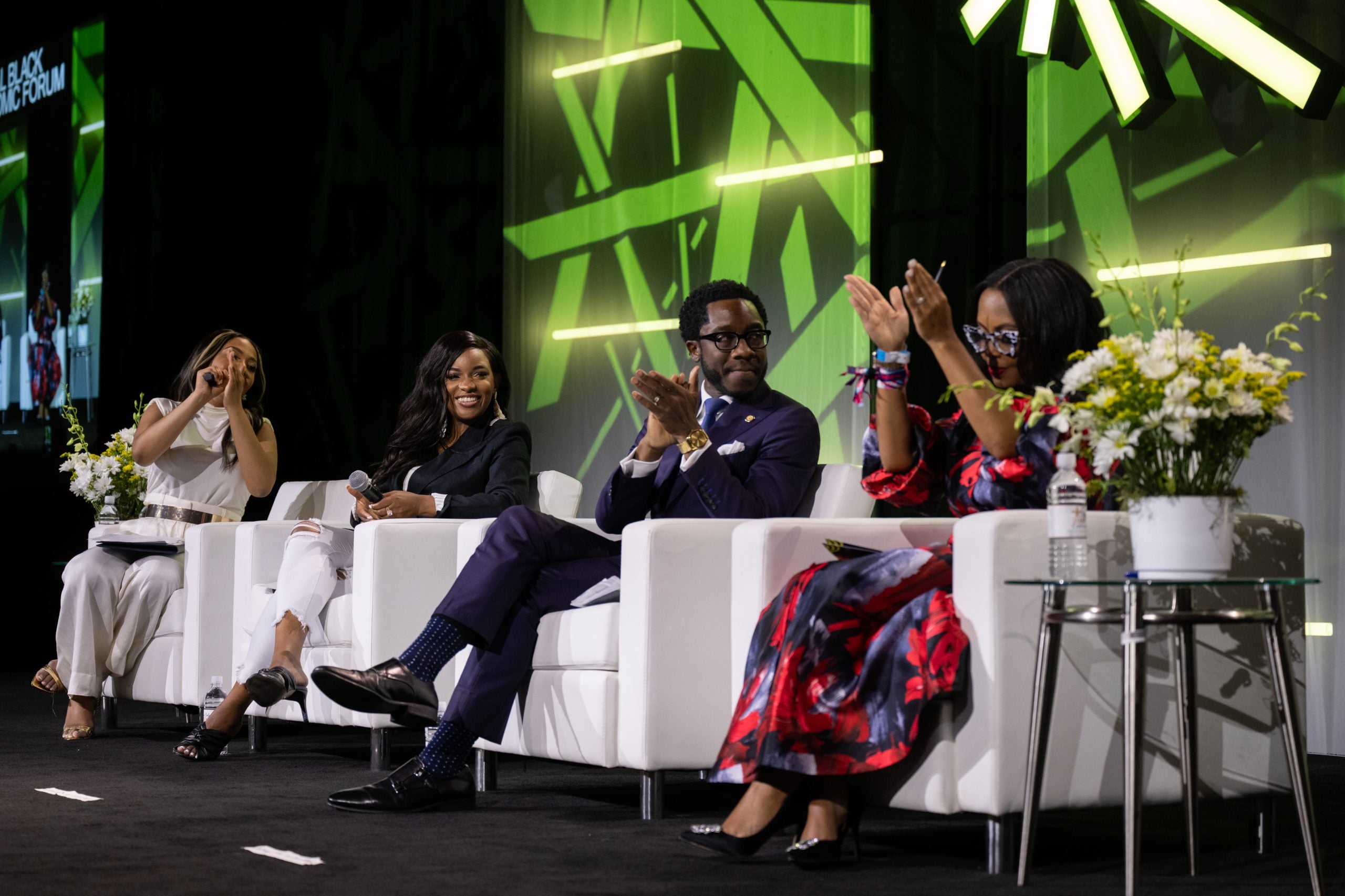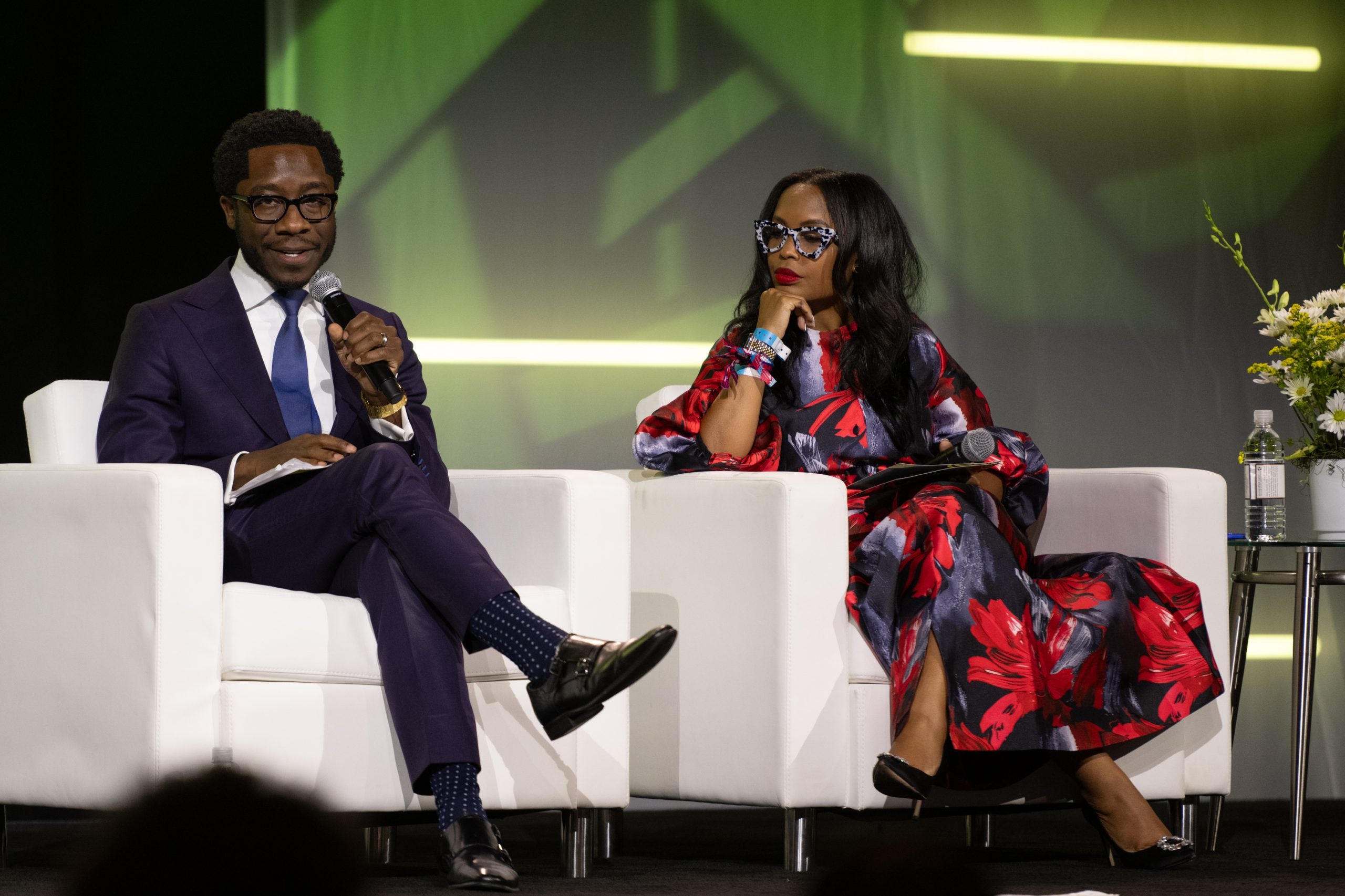
The federal government employs more than two million people, making it the nation’s largest employer. For many, however, understanding or even being aware of the numerous career paths available in public service can be daunting.
During this year’s ESSENCE Festival Of Culture, the Global Black Economic Forum (GBEF) brought together senior leaders from across the federal government for a robust discussion on equity, inclusion, and paths to success should pursue a career in public service be of interest.
The conversation was moderated by Erica Loewe, White House Director of African American Media, whose lighthearted manner got the audience engaged and excited to hear from the trailblazing panelists: Dr. Sesha Joi Moon, Chief Diversity Officer at the U.S. House of Representatives, Congresswoman Jasmine Crockett and Michael Leach, the first Chief Diversity And Inclusion Director at The White House.
From the specifics of their roles and the paths they took to overcoming imposter syndrome, as well as advice for others, the conversation was candid and offered great insight. We broke down and highlighted some of the responses that resonated the most.
On Holding Diversity And Inclusion Roles And Their Purpose
Michael Leach: “Since the beginning of the administration, one of President Biden’s top priorities has been to build an administration reflective of America’s diversity and one that taps into the very best of our nation. And this commitment to making sure we have representation from communities that haven’t always historically had a seat at the table, if you will, is something that President Biden wants to do across the federal government, including in the White House. It has been one of the many reasons that my role was created, again, first of its kind role, really intended to help build and sustain the staff, but also to help foster an inclusive workplace culture that empowers our staff to feel three things and that’s seen, heard and valued while advancing the President’s agenda.”
Dr. Sesha Joi Moon: “When we look at the congressional workforce, we found that it is not yet on par with the national population. And so, we understand that it is vastly important to ensure that the people doing the work in the people’s house are reflective of the congressional districts in which they are elected to serve. In 2020 our office was established by Speaker Emeritus Nancy Pelosi,” said Dr. Moon. “We are here to help create and cultivate a congressional workforce that is reflective of the American people. We do that through an array of service offerings, the most important one being candidate services, where we’re here to connect candidates to careers in Congress, both in Washington, DC and within the districts I’ve been in this role for. I just celebrated my one-year anniversary. Speaker Emerita appointed me last year, and I’ve been retained by the current speaker of the house, Kevin McCarthy.”

On What Its Like Being A Black Woman In Politics
Congresswoman Crockett: “Running for office is not for the faint at heart. Let me be clear about that. Everybody’s going to hate on you. They’re going to talk about what you look like, who your man is, which jobs you have, how you talk, everything is under scrutiny. But if you understand why you’re doing it, then truly believe that God will order your steps along that journey…When you end up occupying a seat like I do, it’s not important that people just see a Black woman sitting there. It’s important that I make sure that I open doors for those coming behind me.”
On Overcoming Imposter Syndrome
Lowe asked the panelists how important it is for those considering careers in government to know that there is a place for them and that it’s its okay to show up as their full selves, braids, afros and all.
Dr. Sesha Joi Moon said: “I am a black queer woman from Richmond, Virginia. I said that in my interview, I made it quite clear that I do not view this work as a partisan issue. I do not think that putting people into the people’s house is red or blue. I feel like that is our mandate of the mission. And I have been able to show up as my authentic self from day one in this job. And I recognize it’s been very important and because people have told me that seeing me has helped them understand that they can aspire for careers in the building.”
“When I think of imposter syndrome, I just want to say one thing because I talk about him on almost any panel, my boss helped me get rid of imposter syndrome. When I went through the interview process and I was offered the position, I had the anxiety of doing the dance of Okay, now how do I negotiate and dance for my worth so that I get my best compensatory package? My boss said, you’re going to get the top, you’re going to get student loan repayment, you’re getting the parking spot, you’re going to work for it, but you’re worth it. You’ve earned it. And I’m not going to make you do that to yourself in this moment. And the last year of my life has been very transformative in this role. And so I pray that everybody else has that same moment within their own career journeys, too,” said Dr. Moon.
Michael Leach: “I’m a faith-driven guy, and impostor syndrome is a very real thing, especially if you’re the first to do anything. I’m a firm believer that we can block our dreams when we allow our fear to grow bigger than our faith. You’re going to have a fear of something, and you’re going have faith for something. And so it’s really important to put people around you and structures in place that can remind you on a consistent basis to keep the faith bigger than the fear.”
The history-making diversity and inclusion director also offered a few great practical tips for overcoming imposter syndrome.
“First, just recognize it, don’t ignore it. Recognize that it’s there but then challenge it. Number two network, everyone communicates, but few connect, connect with the right people to surround you and remind you of what’s possible, who you are, and who you are. And then number three, be very deliberate, to not subject yourself to the external factors that may be at play to discourage you. You know what your unique calling, gifts, and talents are. You are unique, you have a unique contribution to make.”

Advice For Others







Dr. Sesha Joi Moon: “The average person has never heard of a legislative director or correspondent or director of constituent services, they don’t know what these career paths are. So after you vote, I also need you to come into work and inform the public policies that are informing your life…I really do believe that Congress is an employer of choice and so if you are wanting to learn more connect with any of us.”
Michael Leach: “We don’t, as a collective, rise to the level of our goals. We fall to the level of our systems and working in public service is an opportunity for you to have a direct influence on the systems that impact not only your families and your neighborhoods and your cities, but generations.”






